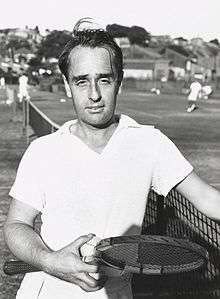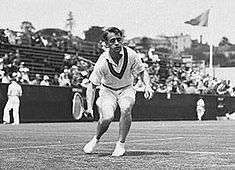Adrian Quist
 | |
| Full name | Adrian Karl Quist |
|---|---|
| Country (sports) |
|
| Born |
23 January 1913 Medindie, South Australia |
| Died |
17 November 1991 (aged 78) Sydney, NSW, Australia |
| Turned pro | 1930 (amateur tour) |
| Retired | 1955 |
| Plays | Right-handed (1-handed backhand) |
| Int. Tennis HoF | 1984 (member page) |
| Singles | |
| Career record | 517-147 (77.8%) [1] |
| Career titles | 46 |
| Highest ranking | No. 3 (1939, Gordon Lowe)[2] |
| Grand Slam Singles results | |
| Australian Open | W (1936, 1940, 1948) |
| French Open | 4R (1935) |
| Wimbledon | QF (1936) |
| US Open | QF (1933) |
| Doubles | |
| Grand Slam Doubles results | |
| Australian Open | W (1936, 1937, 1938, 1939, 1940, 1946, 1947, 1948, 1949, 1950) |
| French Open | W (1935) |
| Wimbledon | W (1935, 1950) |
| US Open | W (1939) |
| Team competitions | |
| Davis Cup | W (1939) |
Adrian Karl Quist (23 January 1913[3] – 17 November 1991) was an Australian tennis player.
Biography
Adrian Quist was born in Medindie, South Australia. His father was Karl Quist, who had been a noted interstate cricketer, and owned a sporting goods store at the time of his son's birth.[4] The tennis legend grew up in Adelaide and once played Harry Hopman, but lost, having given Hopman a head start. He was a three-time Australian Championships men's singles champion but is primarily remembered today as a great doubles player. He won the Australian doubles title 10 years in a row, the last eight together with John Bromwich and he was also one of the winners of a "Career Doubles Slam". Quist was ranked World No. 3 in 1939 and World No. 4 in 1936.[2][5]
In his 1979 autobiography tennis great Jack Kramer writes that in doubles "Quist played the backhand court. He had a dink backhand that was better for doubles than singles, and a classic forehand drive with a natural sink. He was also fine at the net, volley and forehand."
After retiring from playing the game, Quist became a journalist, best known for his articles in The Sydney Morning Herald.[6]
Quist was inducted into the International Tennis Hall of Fame in Newport, Rhode Island, in 1984.
Adrian Quist also held the most Davis Cup victories by any Australian until Lleyton Hewitt surpassed that record on 18 September 2010 in Cairns.
He died in Sydney, New South Wales in 1991, aged 78.[7]
Adrian Quist is the uncle of fashion designer Neville Quist, founding director of Saville Row.
Grand Slam record

- Australian Championships
- Singles champion (3): 1936, 1940, 1948
- Singles finalist (1): 1939
- Doubles champion (10): 1936, 1937, 1938, 1939, 1940, 1946, 1947, 1948, 1949, 1950
- Doubles finalist (2): 1934, 1951
- French Championships
- Doubles champion (1): 1935
- Doubles finalist (1): 1933
- Mixed finalist (1): 1934
- Wimbledon
- Doubles champion (2): 1935, 1950
- United States Championships
- Doubles champion (1): 1939
- Doubles finalist (1): 1938
Grand Slam finals
Singles (3 titles, 1 runner-up)
| Outcome | Year | Championship | Surface | Opponent | Score |
|---|---|---|---|---|---|
| Winner | 1936 | Australian Championships | Grass | 6–2, 6–3, 4–6, 3–6, 9–7 | |
| Runner-up | 1939 | Australian Championships | Grass | 4–6, 1–6, 3–6 | |
| Winner | 1940 | Australian Championships (2) | Grass | 6–3, 6–1, 6–2 | |
| Winner | 1948 | Australian Championships (3) | Grass | 6–4, 3–6, 6–3, 2–6, 6–3 |
References
- ↑ "Adrian Quist: Career match record". thetennisbase.com. Tennis Base. Retrieved 3 November 2017.
- 1 2 United States Lawn Tennis Association (1972). Official Encyclopedia of Tennis (First Edition), p. 425.
- ↑ Davis Cup, Australian Open Archived 2 September 2011 at the Wayback Machine.. Note: The birthdate 4 August 1913 appears in some sources.
- ↑ Victor Richardson - Cricket, Baseball, Australian Football, Golf, Tennis – Sport Australia Hall of Fame. Retrieved 1 December 2012.
- ↑ "World tennis players". The Age. 24 September 1936 – via Google News Archive.
- ↑ "Adrian Quist". www.tennis.co.nf.
- ↑ "Adrian Quist, 78, Tennis Champion" (PDF). The New York Times. 20 November 1991.